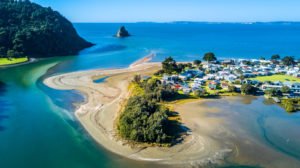A report from the Ministry for the Environment has warned that New Zealand lacks a coordinated plan to deal with future climate change, which threatens hundreds of billions of dollars of property and infrastructure.
 The report, which had been withheld by the previous government, was leaked prior to the September election. Today, Climate Change Minister James Shaw formally released the report, which he said showed a clearer picture of the scale and urgency of climate change.
The report, which had been withheld by the previous government, was leaked prior to the September election. Today, Climate Change Minister James Shaw formally released the report, which he said showed a clearer picture of the scale and urgency of climate change.
The Coastal Hazards and Climate Change guidance is a major revision to the 2008 edition and was published alongside a stocktake report from the Climate Change Adaptation Technical Working Group.
The stocktake found there was significant work required to adapt to climate change, there was a lack of coordination and agreed priorities between agencies and actions had generally been “reactive” after a climate-related event had happened, rather than preparing for future climate change.
Earlier in the week, Newsroom’s Eloise Gibson and Cass Mason wrote about the withheld report, saying that the Thames-Coromandel District Council had factored in a sea level rise of 1 metre in the absence of official guidance, despite advice from flood experts to consider seas 2m higher. The Newsroom article was funded through the Aotearoa New Zealand Science Journalism Fund.
The SMC asked experts to comment on the report.
Belinda Storey, Principal Investigator, Deep South National Science Challenge, comments:
“This is an excellent piece of work. A key change from the 2008 guidance is the introduction of a new approach to decision making. Under climate change, there are many things that you can no longer take for granted like the maximum water level at high tide. In addition to sea level rise, climate change will bring storms that we as a nation have never experienced.
“The coastal guidance draws on an approach to decision making developed in the Netherlands called Dynamic Adaptive Policy Pathways. The beauty of the Dynamic Adaptive Policy Pathways is that it encourages public decision-makers to make choices today that they are least likely to regret later. Choices that leave future decision-makers with at least a few good options.
“At a minimum, we need to be thinking how we can avoid creating even more assets that are going to be stranded by sea level rise and increased storminess.
“One thing that the report is unlikely to resolve however is the ability of local governments to pay for these decisions. Implementation of the report’s recommendations will inevitability involve trade-offs between private property owners’ rights and the interests of the wider community, including ratepayers and beach visitors who not are directly impacted by sea level rise.
“Adapting to sea level rise is going to be expensive. Who pays for adaptation and how the costs of sea level rise are distributed across our communities is something we’re only just starting to seriously examine.
“Local governments don’t have the resources to fully address these issues. These issues are going to require either a material increase in rates and/or central government intervention to ensure fair and equitable outcomes for everyone who lives, works and plays on our coast.”
The report’s release has been covered by local media, including:
Stuff.co.nz: Government lacks ‘coordinated plan’ for climate change, withheld report shows
TVNZ: Climate change needs planning now, councils warned
NZ Herald: Climate change: NZ lacks co-ordinated plan
National Business Review: Cheaper to cut emissions than deal with climate change effects
Newshub: Confusion reigns due to lack of leadership on climate change
Newsroom: Drowning dreams: Billions at stake as Govt mulls sea level rules
Newsroom: Government to release long-delayed sea level rules